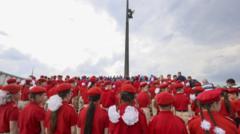El Salvador has announced a prisoner swap with the US involving 250 Venezuelan detainees in exchange for 10 American citizens held in Venezuela. The decision emphasizes diplomatic ties while raising questions from human rights advocates regarding the status and treatment of deportees.**
El Salvador and US Strike Prisoner Exchange with Venezuela, Repatriating 250 Migrants**

El Salvador and US Strike Prisoner Exchange with Venezuela, Repatriating 250 Migrants**
A historic deal sees El Salvador repatriate Venezuelans in exchange for US nationals detained in Venezuela, highlighting diplomatic relations and human rights concerns.**
El Salvador's government has announced a significant prisoner exchange deal with the United States, leading to the repatriation of approximately 250 detained Venezuelans in return for 10 US nationals previously held in Venezuela. This arrangement was confirmed by officials from both countries, who emphasized the humanitarian aspects of the agreement.
The Venezuelans involved in the swap had been detained under controversial circumstances, with many being deported by the US earlier this year and held in the infamous Centre for the Confinement of Terrorism (Cecot) in El Salvador. The flight repatriating the migrants is set to arrive in Maiquetía, Venezuela, later today. A senior US administration official revealed that, as a result of this exchange, there are currently no US citizens detained by the Venezuelan government led by President Nicolás Maduro.
In a social media post, El Salvador's President Nayib Bukele announced the exchange and underscored the release of Venezuelan nationals accused of affiliations with the criminal organization Tren de Aragua (TDA). He indicated that the swap also involved the release of Venezuelan political prisoners. US Secretary of State Marc Rubio acknowledged the deal, expressing gratitude to Bukele for his efforts.
While US officials have opted not to publicly disclose details about the released American nationals due to privacy concerns, reports suggest one of them may include former Navy Seal Wilbert Joseph Castaneda, who had been detained while visiting Venezuela.
The Venezuelans being released, including Oscar González Pineda, expressed relief upon learning of their imminent return. His mother, Gertrudis, celebrated his release, asserting that her son had no links to criminal gangs.
A senior Trump administration official characterized El Salvador's move to facilitate the exchange as an "independent decision" made for humanitarian reasons, reiterating that the US considered the detainees as gang members. However, families of some deportees have contested these claims, insisting on their loved ones' innocence.
The complex nature of this deal was evident, as the official noted that negotiations were contentious up until the last moment, expressing relief that all parties involved were safely en route to reunite with their families. The rapport between President Bukele and former President Trump has been relatively supportive, particularly in the context of handling deported migrants from the US.
In previous engagements, Bukele had voiced proposals to swap Venezuelan deportees for political prisoners, including opposition figures and activists detained amid Venezuela's domestic crackdowns. Although Maduro’s government had previously rejected such proposals, US officials indicated that the prospect of retrieving American citizens created a critical opening for negotiations.
Despite the successful exchange, the US maintains its stance of not having official diplomatic relations with Venezuela, emphasizing the ongoing limitations posed by heavy sanctions. Moreover, reports of potential human rights abuses related to deportees remain a pressing concern, following the troubling case of Kilmar Ábrego García, who alleged torture after being mistakenly deported to El Salvador.
As the deal unfolds, it underscores not only the diplomatic efforts between the US and El Salvador but also the intricate web of human rights considerations that accompany such exchanges in the international arena.




















